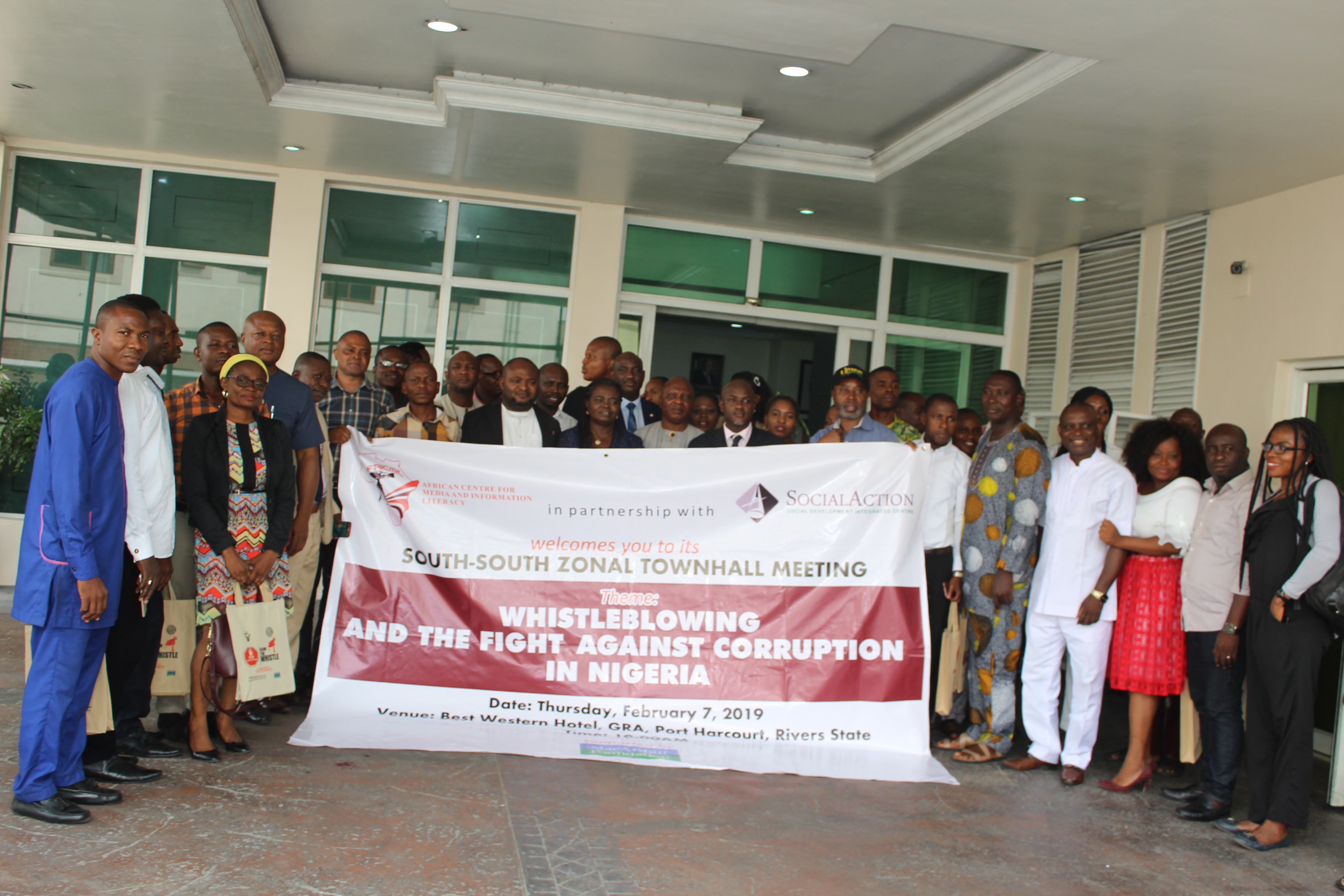The African Centre for Media and Information Literacy (AFRICMIL), Thursday said Nigerians can ensure accountability and good governance in the country if they made it a habit to expose corruption.
Chido Onumah, AFRICMIL Coordinator, said this at a town hall meeting on whistleblowing and the fight against corruption in Nigeria held in collaboration with the Social Development Integrated Centre (Social Action), in Port-Harcourt, Rivers State.
He said there was need for Nigerians to be conscious of their role in tackling corruption as it is not a menace the federal government can fight alone.
According to him, “As Nigerians, we must be aware that the fight against corruption is not one to be left for government alone. We all have roles to play and this is what the whistleblowing policy seeks to ensure.”
Onumah noted that AFRICMIL in a bid to lend its support to the anti-graft war, launched a sensitization campaign on whistleblowing termed Corruption Anonymous in 2017. The campaign seeks to raise awareness on the whistleblowing policy of the federal government which was introduced in December 2016. Corruption Anonymous seeks to make Nigerians see the need to embrace whistleblowing as an effective tool in the fight against corruption. The project is supported by The John D. and Catherine T. MacArthur Foundation.
In his presentation, the representative of Dr. Mohammed Dikwa, Secretary of the Presidential Initiative on Continuous Audit (PICA), Johnson Oludare, said the support of some Nigerians who submit tips has yielded positive results as huge sums of money have been recovered, while the issue of ghost workers and civil servants receiving salaries from MDAs where they no longer work is being dealt with.
The acting chairman of the Economic and Financial Crimes Commission (EFCC), Ibrahim Magu, who was represented by Usman Muktar, said although the EFCC was always ready to carry out its duties in the fight against corruption, many Nigerians are afraid to blow the whistle for fear of reprisal.
He however pointed out that the proposed whistleblower protection bill in the National Assembly has provisions to check that.
According to him, “This challenge will be addressed by the Whistle Blower Protection Bill in the National Assembly. The bill provides that a person who makes a disclosure shall not be subject to victimisation by his or her employers or by fellow employees.
“Additionally, a person who makes a disclosure has the right to take legal action if he or she is victimised, dismissed, suspended, declared redundant, transferred against his or her will, harassed or intimidated in any manner. This is by all means legal and administrative protection for the whistle blower.”
Mr Magu, therefore, called on Nigerians to make use of the policy and help sanitise the country.
Addressing participants at the event, the representative of Prof. Bolaji Owasanoye, Chairman of the Independent Corrupt Practices and other Related Offences Commission (ICPC), Umar Madu-Bah, noted that whistle blowing was an old phenomenon in the Commission. According to him, the ICPC had established various platforms to solicit and encourage people to fully participate in the fight against corruption such as the Anti-corruption Transparency Units (ACTU) in Ministries, Departments and agencies (MDAs) of government. He said initiatives such as NAVC, ICPC/NYSC CD groups are also about whistle blowing, leading to more exposure of corrupt practices. He added that the Commission’s convictions and recoveries were made available on its website www.icpc.gov.ng for citizens to see and also engage the Commission.
While noting that not all petitions are factual and as such not treatable, he advised whistleblowers to be sure of their petitions and have enough information to backup their claims to make it easy for investigation by the ICPC.
Similarly, Sotonye Isokariari, who represented the chairman of the Code of Conduct Bureau (CCB), revealed that some cases submitted to the CCB by supposed whistleblowers were not investigated because of the nature of the petitions.
“Nigerians now use the Code of Conduct Bureau to settle their personal scores instead of blowing whistle for the common good of all,” she said.
She called on Nigerians to be selfless and act when the need arises, noting that though there are discussions about the anti-corruption war, most citizens only hear but do not act.
A participant at the event, Memdiri Ezobo, who commended AFRICMIL however said there was need to take the campaign to the primary, secondary and tertiary institutions to correct the already polluted values of citizens.
Another participant, Gabriel Benneth of the Support Initiative for Sustainable Development (SISDev), said there was a need for continuous engagement on whistleblowing in the country.
Earlier, the Acting Executive Director of Social Action, Vivian Okafor, who was represented by Arochukwu Paul commended the whistleblowing initiative and indicated its support to sensitize citizens around in the South-south zone of the country on their social responsibility in exposing corruption.
The representative of the Director General of the National Orientation Agency (NOA), Nkangwung Asuk, said the agency was doing a lot to sensitize Nigerians about the effect of corruption and other social vices.
Report by Doyin Ojosipe/AFRICMIL



